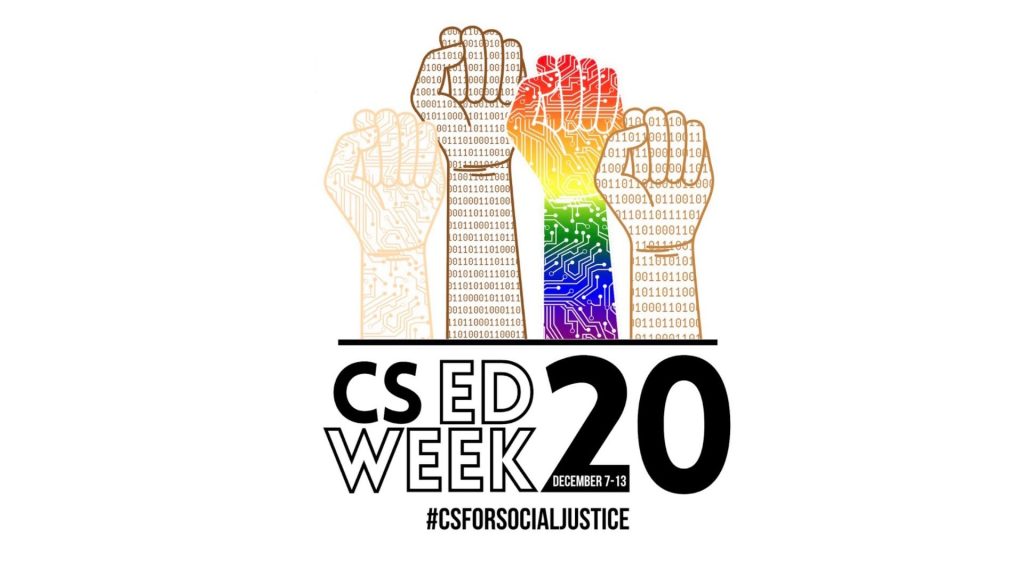It is the most wonderful time of the year. Yes, it is the holiday season, but the month of December is when educators worldwide celebrate Computer Science Education Week!
Founded in 2009 by the Association for Computing Machinery (ACM), Computer Science Week originated as an effort to convince policymakers to promote computing as a core science and profession. ACM chose the week of December 9th in honor of Grace Hopper’s birthday. (Hopper was the creator of the very first compiler—a computer program that translates code written in one programming language into another—and is credited with coining the word “bug” to mean an error in a program).
Since 2009, Computer Science Week has grown dramatically, becoming a collaborative worldwide call to promote computer science education broadly. At the heart of the movement is a focus on improving inclusivity in the field—historically dominated by white males—by focusing on introducing women and others from underrepresented groups to computer science.
According to the College Board, “women who try AP Computer Science in high school are 6 times more likely to major in computer science than those who do not, and Black/African American, Hispanic /[LatinX] students are 7 to 8 times more likely”. Historically, young women represented only 22% of those taking the AP exam while students of of color only represented 13%. For many, the lack of diversity in the field is not from lack of interest but rather a lack of access and awareness.
And that’s where Computer Science Week and the Hour of Code come in.
Adopted by Computer Science Week in 2013, the Hour of Code is intended to offer a gentle introduction to computer science through fun, one-hour interactive activities accessible through the Code.org website. Since its introduction, 1,106,972,371 people have tried an Hour of Code activity, of which, “45% of Code.org students are young women, 50% are students from marginalized racial and ethnic groups, and 45% of US students are in high needs schools.”
While such efforts to increase diversity and access are exciting, they alone are not enough; we must strive for further equity and inclusivity in the field. To that end, this year’s Computer Science Week theme—computer science for social justice—goes beyond issues of diversity to offer deeper consideration of these timely and complex issues.
Computer science for social justice asks us to consider questions—not only about how computer science can be a positive catalyst for change—but, just as importantly, how it currently perpetuates inequities, including sexism, ableism, and systemic racism.
Want to be inspired? Checkout the hashtags #CSforGood and #CSforSocialJustice to see how innovators across the globe are tackling some of these thorny issues and harnessing (transforming?) computer science for the social good.
Some project highlights include:
- Investigations into how discrimination is built into artificial intelligence and facial recognition systems,
- Critical analysis of how cultural values, including racist beliefs, are encoded into the technologies that we create,
- The creation of video games intended to develop empathy and awareness for the daily lived experiences of marginalized groups,
- Widespread work to make computing more accessible to those with disabilities,
- Apps and software dedicated to reducing users carbon footprints to slow climate change, and
- Coordinated efforts to build mentorship networks for underrepresented groups.
Together, projects like these offer a powerful reminder of the hard work left to be done as we move towards an equitable future, as well as the promise that lies ahead. With all that has gone on in the world this year, there is no better time to talk about access, inequality, and privilege in technology and its role in education and society. I look forward to exploring these issues with our students in the months to come.
CA’s Computer Science Week is presented by the advanced topics’ computer science class and the Women in Science & Engineering club. As with all things 2020, it looks a bit different this year. While we haven’t been able to offer many of the in-person events that typically characterize the week, we did kick off with a celebratory Hour of Code last week (congratulations to student winner Matthew Schricker ’23, and our faculty winner Charlotte Kelly for completing the most activities).
And, happily, while the world may have ended their Computer Science Week celebrations, ours will evolve into something bigger throughout the year; this year’s theme of #CSforSocialJustice is too big and too important for just one week. Stay tuned for future events held by the WISE club and a host of activities on future Flex days.
The National Center for Women & Information Technology (NCWIT) annual campaign has used the phrase “The idea you don’t have is the voice you haven’t heard. Inclusion changes what’s possible. […]”. With that in mind, I invite everyone to join in the conversation and reach out to me if you would like to be involved in some way.

